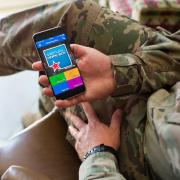
Patients under treatment for psychological health issues sometimes experience episodes of significant distress in their everyday lives while away from the clinic and immediate care. This poses a dilemma for a provider. How can psychological coping skills best be made available for those unpredictable, remote and potentially serious situations? One convenient tool that many providers recommend to their patients is the Virtual Hope Box (VHB).
During episodes of significant distress, individuals often dwell on negative thoughts and feelings and find it hard to get out of that frame of mind. The VHB is a smartphone app designed to help a user manage and cope with those thoughts and feelings. The VHB coaches the user in controlled, diaphragmatic breathing techniques, demonstrates progressive muscle relaxation, and leads guided mindfulness meditations that can ameliorate stress and anxiety. It also contains individually tailored reminders of self-worth and reasons for living, distractions that temporarily take a user’s mind off a stressful interval, inspirational texts and aphorisms, and a number of other coping aids.
There are tens of thousands of health apps to choose from but little or no scientific evidence that they work. How do we know the VHB is any good? The VHB was developed and tested over a number of years using rigorous methods (Bush, Armstrong, & Hoyt, 2018). Two scientific studies were conducted in the clinical environment with VA patients who were considered at high risk for suicidal ideation. One study of the VHB ensured its safety and acceptance by providers, and patients (Bush et al., 2015). Results from that study were used to improve the VHB. The second study was a randomized trial that showed that the VHB significantly increased skills for coping with distress (Bush et al., 2017). Both studies showed that the VHB was extremely popular with both patients and their providers and was used regularly.
Since it was launched in 2014, the free VHB has been downloaded more than a half-million times (568,046 as of 4/11/19). The VHB has been a useful and highly regarded accessory to primary treatment ‒ an easily accessible tool that users report helps restore emotional stability and manage stress “when and as needed”.
Blog Author
Nigel Bush, PhD, Psychological Health Center of Excellence (https://www.pdhealth.mil), Defense Health Agency
Photo courtesy of Defense Health Agency Connected Health Branch
References
Bush, N. E., Armstrong, C. M., & Hoyt, T. V. (2018, November 8). Smartphone apps for psychological health: A brief state of the science review. Psychological Services. Advance online publication. doi:10.1037/ser0000286
Bush, N., Dobscha, S., Crumpton, R., Denneson, L., Hoffman, J., Crain, A., Kinn, J. (2015). A virtual hope box smartphone app as an accessory to therapy: Proof‐of‐concept in a clinical sample of veterans. Suicide and Life‐Threatening Behavior, 45(1), 1-9. doi:10.1111/sltb.12103
Bush, N., Smolenski, D., Denneson, L., Williams, H., Thomas, E., & Dobscha, S. (2017). A virtual hope box: Randomized controlled trial of a smartphone app for emotional regulation and coping with distress. Psychiatric Services,68(4), 330-336. doi:10.1176/appi.ps.201600283
Download Virtual Hope Box from:
iPhone: https://itunes.apple.com/us/app/virtual-hope-box/id825099621?mt=8
Android: https://play.google.com/store/apps/details?id=com.t2.vhb